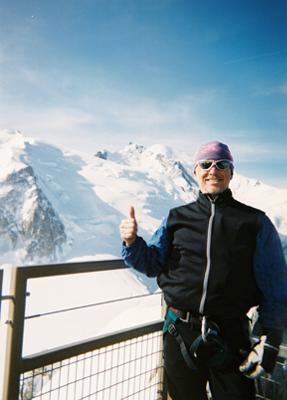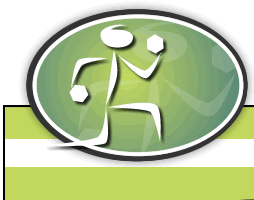Have the Time to Prep & Assimilate!
by George Thomas
(Steamboat Springs, CO)

On the Aiguille du Midi, Mt. Blanc, France
NSCA's CSCS exam is difficult.
That's not a secret, but more to point, if you are someone with some experience working with athletes and conducting physical fitness sessions, it's very easy to get sucked into thinking, "How hard could it be?" Well, of course the answer depends on the depth of your background, but questions such as "What is the rate-limiting step of glycolosis?" (phosphofructokinase)could be a tough one for any sports professional except perhaps someone who majored in bio chemistry. But even that specialty could be irrelevant when asked "In fitness testing, what criterion-referenced validity is known as the "gold standard?" (convergent validity).
Now, not to scare anyone off, it is possible to pass the test. I'm a witness. Despite feeling very disheartened when leaving the campus where the test was administered, I was shocked to find that I had indeed passed. The relief was overwhelming, as I was already trying to figure out how I was going to do a better job preparing for the retest. I confess, as someone who was confident in my skills developing conditioning programs for college athletes,
I began preparing for the test, way too casually. With exactly two months to go prior to the test, and being unemployed, my plan was to spend a few hours each day studying and the rest of the day riding my bike or working out. It didn't take long to realize, based on the number of pages I could digest daily of Essentials of Strength and Conditioning that I was going to have to put a lot more hours into it than I originally imagined. I averaged about four hours per day studying, seven days a week for the two months. But I was in the library each day for around five or six, because I would have to take frequent brain breaks, or look up more detailed explanations on the web. More than five hours of actual study on any given day was never possible because I would hit information overload and start to lose it. With 22 chapters, I was able to read on average, a bit less than one per day. So, I had completely read the textbook in one month, and devoted the second month to review my notes and reread the most difficult or information-deep chapters. Even so, at the time I took the test, I would have paid a lot to have had one more week to feel really confident.
Being tight on money, I only used the textbook and the three volumes of NSCA's practice tests. Some of the other ancillary preparation materials may have been helpful, but I didn't have the money to pay for them. It was frustrating when I felt that I "knew" a chapter, and then would score just above minimum on a practice test. The most difficult problems were questions that would offer four possible answers, and while one might be easily dismissed, two or even three possibilities would be so similar that it was very difficult to ascertain the most correct answer. For instance, "What is the most efficient means of determining athlete hydration needs when it is hot out?" The text book states that coaches can weigh athletes before and after practice, which is very accurate, but it also states that coaches should check the wet bulb data for the day. I remembered both instructions, but the question asked what method was most efficient? So, while either answer helps determine hydration needs, the right answer hung on remembering to which method the adjective applied. Now multiply this problem times the 200 questions on the test. My method of study was to take manual notes of terminology and key concepts for each chapter. My notebook ultimately came to 240 handwritten pages (it had lots of spaces and indents). After reading the textbook, in the second month I went back and reviewed all my notes turning the pages of the textbook concurrently to recheck, review or refamiliarize myself with areas of the text on which my notes were skimpy. When reviewing the notes, I highlighted technical terms and very short key phrases. In that way, I was able to re-review these notes of the notes very quickly over the last few days prior to the exam. This may not be everyone's cup of tea, and I probably would not have been that anal except for the practice exams keeping me very uptight about how well I was assimilating the information. In general, I would offer the following:
1. At a minimum, you must read the textbook cover to cover. As it is nearly 600 pages in length, after a bit of reading, you can extrapolate to figure out how long it will take to wade through it all.
2. As it is so information dense, you should read each chapter slowly enough to properly assimilate it. In retrospect, one strategy that may have worked better, would have been to periodically review my notes from previous chapters every few days. In my case I didn't really review until after I had read the whole textbook.
3. While I was often worried about how deep the questions would drill down relative to say the Krebs Cycle, or protein/enzyme chemical interaction, these details I found were not adressed too much in the actual test. Being generally knowledgable about bio-energy pathways, cardiovascular and respiratory anatomy and physiology is important, but while the textbook steps you through the chemical reaction chain of glycolysis for instance, as far as the actual exam, these micro details are not especially important.
4. On the other hand, do be very clear on muscle anatomy and physiology, including the sliding filament theory and the structure of the sarcomere.
5. Questions related to exercise technique for resistance exercise and plyometrics are very specific! Consequently, for each exercise pictured in the textbook, take some time at the gym and recreate the movements and actions exactly as described. For instance, doing box step ups, if you start by stepping up with the right foot, followed by the left, you should know which foot steps back down first according to the textbook. If you have to guess, you'll be quite annoyed.
6. In the textbook and on the test there will be scenarios where an athlete of a given age, gender and sport has certain fitness testing results looking at major fitness components, such as speed, agility, power, etc. You should be very clear on reading these results, because you will be asked what areas need improvement. So, is 11.6 sec in the T-Test poor, average or excellent for a female prep volleyball player? College wrestler? NFL defensive lineman? etc. It will take some time to familiarize yourself with the testing results and how it applies to different sports, age groups and genders. But you will have to go through it.
7. The section on nutrition might require a tiny bit of math, because you will be asked for instance how many grams of fat are needed on a daily basis for a 70kg endurance runner, for instance. So, know caloric quantities of different nutrients and requirements for balanced nutrition.
8. Do purchase the official NSCA practice exams. They will keep you, challenged, humble and hopefully dedicated.
9. During the test, if there is a question that you are fumbling with, note it and move on. After you've marked all the answers to questions you are familiar with, then go back and wrestle with the trickier questions. I found that by putting a difficult question on hold I was better able to deconstruct and answer it after spending time on other more tractable questions.
10. Unless you have a degree in exercise physiology and kinesiology, and have been coaching athletes extensively, allow enough time to prepare for the test. In addition to being challenging, it is expensive, so why waste the money if you have only a few weeks to prepare.
11. You may only be able to study a little bit each day. I had two straight months with no other distractions. In either case, initially the prospect of digesting all the materials can be intimidating, but you have to take the "how do you eat an elephant?" approach. One bite at a time. If you're disciplined and patient enough to insist that you "own the information," before you know it, some nameless proctor will be saying, "Now open your exam booklet to page 1," and hopefully, you'll feel pretty cocky about it. Best of luck.





